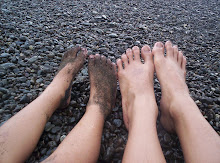The attitude in the ward makes me angry.
You wake up in the morning to the harsh voice of the nurse. "O, yung mga bantay dyan, gising na! Magligpit kayo, wala kayo sa mga bahay nyo!"
In the evening, some watchers turn off the overhead fluorescent bulbs because it is hard to sleep in the harsh glare. The nurse would come in and scold. "Yang ilaw, buksan nyo! Wala kayo sa condo, nasa ward kayo!"
Some nurses are condescending. If I go to the nurse station well-dressed, and address them as 'Sir' and 'Ma'am,' the nurses answer my questions respectfully. But I have seen the same nurses ignore a watcher who has come back twice to report that her patient has vomited and needed assistance.
Ate Malou developed rashes from wearing adult diapers. I brought her a tube of Drapolene Cream one time. We always have Drapolene at home. Aside from diaper rash, it soothes heat rash and minor itches and kitchen burns, and it's a good remedy for rough elbows and knees.
When the nurse asked her how her rashes are, Ate Malou said they have dried up because she used Drapolene. The nurse seemed surprised. She said, Why do you have Drapolene? That's usually used in the pay ward. Here we tell the patients to use petroleum jelly. She proceeded to advise Ate Malou to hide the Drapolene, so that the head nurse would not see it. She said, if you have Drapolene, maybe you should be in the pay ward.
I told Ate Malou that the next time someone asks about the Drapolene, she should say she stole it from the pay ward.
The staff who attend to the charity ward all seem to be allergic of things they consider 'sosyal.' Aside from Drapolene, they bestow suspicious looks on big bottles of lotion (Ate Malou has requested that I bring her a bottle of Jergens because she so hates dry skin), branded bags, and five-inch-heels on visitors who always manage to arrive outside of visiting hours. I don't have to explain that the guards never ask me questions, although they hold back the throng of visitors who arrive early for the afternoon-only visiting hours.
The staff who bring in food are loud and rude. The cleaners are always in a foul mood. On Ate Malou's fifth day in the corridor I asked an attendant if there is a chance we can get a bed with those metal contraptions in it so her leg could be elevated. He answered in a raised voice that some people need to have patience and that we have to wait for another patient to get discharged so he could assign a bed. I couldn't argue. I was afraid I'd displease him and they'd make Ate Malou wait another week for her bed.
Ate Malou has a roommate, an old old woman who also broke her leg and has been a long-term patient at the ward. She usually does not have a watcher, so the other watchers help out in feeding her or handing her what she needed. The Sunday I was there, the old woman was trying to eat. She drinks water from a bottle with a straw. And since she cannot sit up, the food particles are scattered around her on the bed. There were some suman wrappings on the floor. A watcher helped her open a packet of biscuits. I cleaned up some dried rice on her bed and picked up her trash. The other patients say that if the nurse arrives and she has made a mess, she gets scolded. It is worse when she has soiled her diaper, because the nurse who comes to clean her up arrives angry. I asked her if she's alright. She said yes and called me 'Ma'am.'
If you ask for clarification on the long wait for the schedule of surgery, the nurse would remind you that you are in the charity ward and the waiting list is long. If you didn't want to wait, you could transfer to the pay ward, where you'd have a higher priority. The staff would tell you that if you find the room too hot or too noisy, you could always transfer to the pay ward, where the rooms are airconditioned. I am almost sure that the same nurse who is angry to be called to clean up the mess of one old woman in the charity ward would quietly, willingly attend to the mess of another old woman in the opposite corridor, the pay ward.
I am sure not everyone in the hospital acts that way. But it is very disappointing to receive that treatment from the very people who are supposed to take care of you.
If you are admitted to the charity ward of a public hospital, it means you have no money. Does it have to mean you have no dignity?





















No comments:
Post a Comment